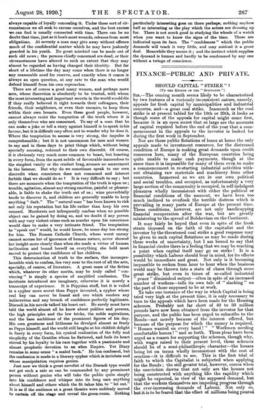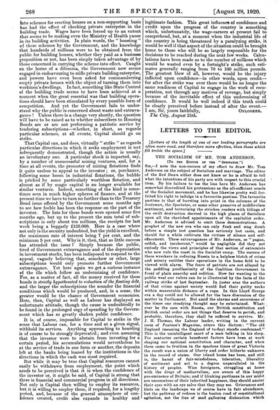FINANCE—PUBLIC AND PRIVATE.
SHOULD CAPITAL " STRIKE " [To THE EDITOR or THE " SPECTATOR."] SIR,—The coming month seems likely to be characterized by two features of a curiously inconsistent nature, namely, appeals for fresh capital by municipalities and industrial. concerns, and—a great coal strike. Inasmuch as the coal strike is at present tabled for the 18th or 20th, it looks as though some of the appeals for capital might come first, because it is an open secret that so large are the amounts of capital required before the end of the year that a com- mencement in the appeals to the investor is looked for during the first week in September.
Nor are these public flotations of loans at home the only appeals made to investment resources, for the distressed. condition of Europe is making great demands upon credit resources here, many of the European countries being quite unable to make cash payments, though at the same time it is impossible for many of them even to make a commencement in re-starting industrial activities with- out obtaining materials and machinery from other countries. Immersed as we are in our own political and social troubles, and occupied, as unfortunately a very large section of the community is occupied, in self-indulgent pleasures wholly inconsistent with either the political or financial conditions of the moment, we have been too much inclined to overlook the terrible distress which is prevailing in many parts of Europe at the present time. These conditions, however, are not only handicapping financial recuperation after the war, but are greatly ministering to the spread of Bolshevism on the Continent.
It may fairly be hoped that even in spite of the fresh strain imposed on the faith of the capitalist and the investor by the threatened coal strike a good response may be given to such capital flotations as may be made during these weeks of uncertainty, but I am bound. to say that in financial circles there is a feeling that we may be reaching a point when capital itself may go on strike ! It is a possibility which Labour should bear in mind, for its effects would be immediate and great. Not only is it becoming impossible to reckon from hour to hour when the business world may be thrown into a state of chaos through some great strike, but even in times of so-called industrial peace " diminished output—often in spite of an increased number of workers—tells its own tale of " slacking " on the part of those supposed to be at work. To take one instance of the way in which Capital is being tried very high at the present time, it is only necessary to turn to the appeals which have been made for the Housing schemes. Probably not far short of 40 to 50 million pounds have now been obtained from the investor for that purpose, and the public has been urged to subscribe to the Bonds—not merely because of the interest offered, but because of the purpose for which the money is required. " Houses wanted on every hand ! " " Workmen needing comfortable homes ! " and so forth. These pleas have been urged as a reason for supporting the schemes, though why, with wages raised to their present level, these schemes should be of a semi-philanthropic character—the houses being let on terms wholly inconsistent with the cost of erection—it is difficult to see. This is the first trial of faith to which the Capitalist is subjected when applying for the Bonds ; the still greater trial, however, comes when the conviction dawns that not only are the houses• not being constructed with anything like the rapidity which might be expected, in view of the supposed demand, but that the workers themselves are impeding progress through the ever-increasing demands of Labour. Not only so, but it is to be feared that the effect of millions being poured Into schemes for erecting houses on a non-supporting. basis has had the effect of checking private enterprise in the building trade. Wages have been forced up to an extent that seems to be making even the Ministry of Health pause in its building activities. In plain words, the " boosting " of these schemes by the Government, and the knowledge that hundreds of millions were to be obtained from the public for building houses, whether they paid as a business proposition or not, has been simply taken advantage of by those concerned in carrying the scheme into effect. Caught on the horns of a dilemma, the Government now seems engaged in endeavouring to stifle private building enterprise, and powers have even been asked for commandeering empty private houses with the object of turning them into workmen's dwellings. In fact, something like State Control of the building trade seems to have been achieved at a moment when the great essential was that building opera- tions should have been stimulated by every possible form of competition. And yet the Government fails to under- stand why the public is concerned about waste and extrava- gance ! Unless there is a change very shortly, the question will have to be raised as to whether subscribers to Housing Bonds are or are not performing a patriotic service by tendering subscriptions—whether, in short, as regards particular schemes, at all events, Capital should go on strike.
That Capital can, and does, virtually " strike " as regards particular directions in which it seeks employment is not infrequently demonstrated, though the action is usually an involuntary one. A particular shock is imparted, say, by a number of unsuccessful mining ventures, and, for a time at all events, the promoter of mining flotations finds it quite useless to appeal to the investor ; or, perchance, following some boom in industrial flotations, the bubble is pricked by some particularly worthless flotation, and almost as if by magic capital is no longer available for similar ventures. Indeed, something of the kind is some- times seen in much higher spheres of finance, and at the present time we have to turn no further than to the Treasury Bond issue offered by the Government some months ago to see how feeble has been the response on the part of the investor. The lists for these bonds were opened some five months ago, but up to the present the sum total of sub- scriptions is only about ten millions, the receipts for last week being a beggarly £150,000. Here is a case where not only is the security undoubted, but the yield is excellent, the maximum rate of interest being 7 per cent. and the minimum 5 per cent. Why is it, then, that so little success has attended the issue ? Simply because the public, tired of Government extravagance and of the depreciation in investment stocks, has been indisposed to respond to the appeal, vaguely believing that, somehow or other, large subscriptions would only promote further Government extravagance. Yet here again we get a curious instance of the ills which follow an undermining of confidence. For, as a matter of fact, all the money received for these bonds is strictly hypothecated to reduction of the floating debt, and the larger the subscriptions• the sounder the financial conditions which would be produced, and, in a sense, the greater would be the chance of Government economies. Here, then, Capital as well as Labour has displayed an unfortunate attitude, though the cause is undoubtedly to be found in the prolonged orgy of spending by the Govern- ment which has so greatly shaken public confidence.
It is, of course, impossible for Capital to strike in the sense that Labour can, for a time and at a given signal, withhold its services. Anything approaching to hoarding is of course to be strongly deprecated ; and even assuming that the investor were to abstain from investing for a certain period, his accumulations would nevertheless be at the service of trade in one form or another, the deposits left at the banks being loaned by the institutions in the directions in which the cash was most required. But while it may be true that Capital resources cannot easily be withdrawn from employment, the point which needs to be perceived is that it is when the confidence of the investor or, it might be said, of Capital is strong that there is financial and commercial progress in all directions. Not only is Capital then willing to employ its resources, but it is willing to employ them, if required, for a lengthy period, and, because of the general atmosphere of con- fidence created, credit also expands in healthy and legitimate fashion. This great influence of confidence and credit upon the progress of the country is something which, unfortunately, the wage-earners at present fail to comprehend, but, at a moment when the industrial life of the country is being threatened by a paralyzing strike, it would be well if that aspect of the situation could be brought home to those who will be so largely responsible for the decisions to be reached during the next few weeks. Calcu- lations have been made as to the number of millions which would be wasted even by a fortnight's strike, such esti- mates generally ranging from 70 to 100 million pounds. The greatest blow of all, however, would be the injury inflicted upon confidence—in other words, upon credit— for after the strike was over there would be no longer the same readiness of Capital to engage in the work of recu- peration, not through any motives of revenge, but simply because of the inevitable effect of this undermining of confidence. It would be well indeed if this truth could be clearly perceived before instead of after the event.—



































 Previous page
Previous page